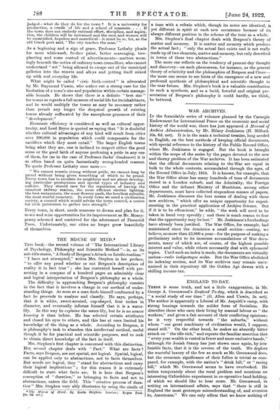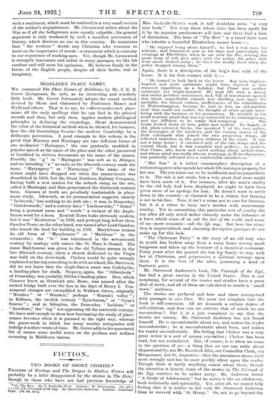ENGLAND TO-DAY.
THERE is some truth, and not a little exaggeration, in Mr. George A. Greenwood's England To-day, which is described as " a social study of our time " (G. Allen and Unwin, fis. net). The author is apparently a Liberal of Mr. Asquith's camp, with strong leanings towards the milder form of Socialism. He describes those who earn their living by manual labour as " the workers," and gives a fair account of their conflicting opinions ; he is very respectful towards " the suburbs," without whom " our great machinery of civilization would, I suppose, stand still." On the other hand, he makes an absurdly bitter attack on " the idle rich," and repeats the familiar assertion that " every year wealth is vested in fewer and more exclusive hands," although Sir Josiah Stamp has just shown once again, by irre- futable facts, that it is the reverse of the truth. We deplore the wasteful luxury of the few as much as Mr. Greenwood does, but the economic significance of their follies is trivial as com- pared, for example, with the nation's " drink bill," or " racing bill," which Mr. Greenwood seems to have overlooked. He writes temperately about the rural problem and mentions an interesting Oxfordshire experiment in co-operative land-holding, of which we should like to hear more. Mr. Greenwood, in writing on international affairs, says that " there is still in England the most grotesque misunderstanding of, and aversion to, Americans." We can only affirm that we know nothing of
such a sentiment, which must be confined to a very small section at the author's acquaintance. Mr. Greenwood writes about the War as if all the belligerents were equally culpable ; his general argument is only weakened by such a manifest perversion of history, which deceives no one in this country. He maintains that " the workers " deride any Christian who ventures to insist on the importance of creeds—a statement which is contrary to our experience of working-men. Yet, though Mr. Greenwood is strangely inaccurate and unfair in many passages, we like his candour and still more his optimism. He believes firmly in the future of the English people, despite all their faults, real or imaginary.



































 Previous page
Previous page